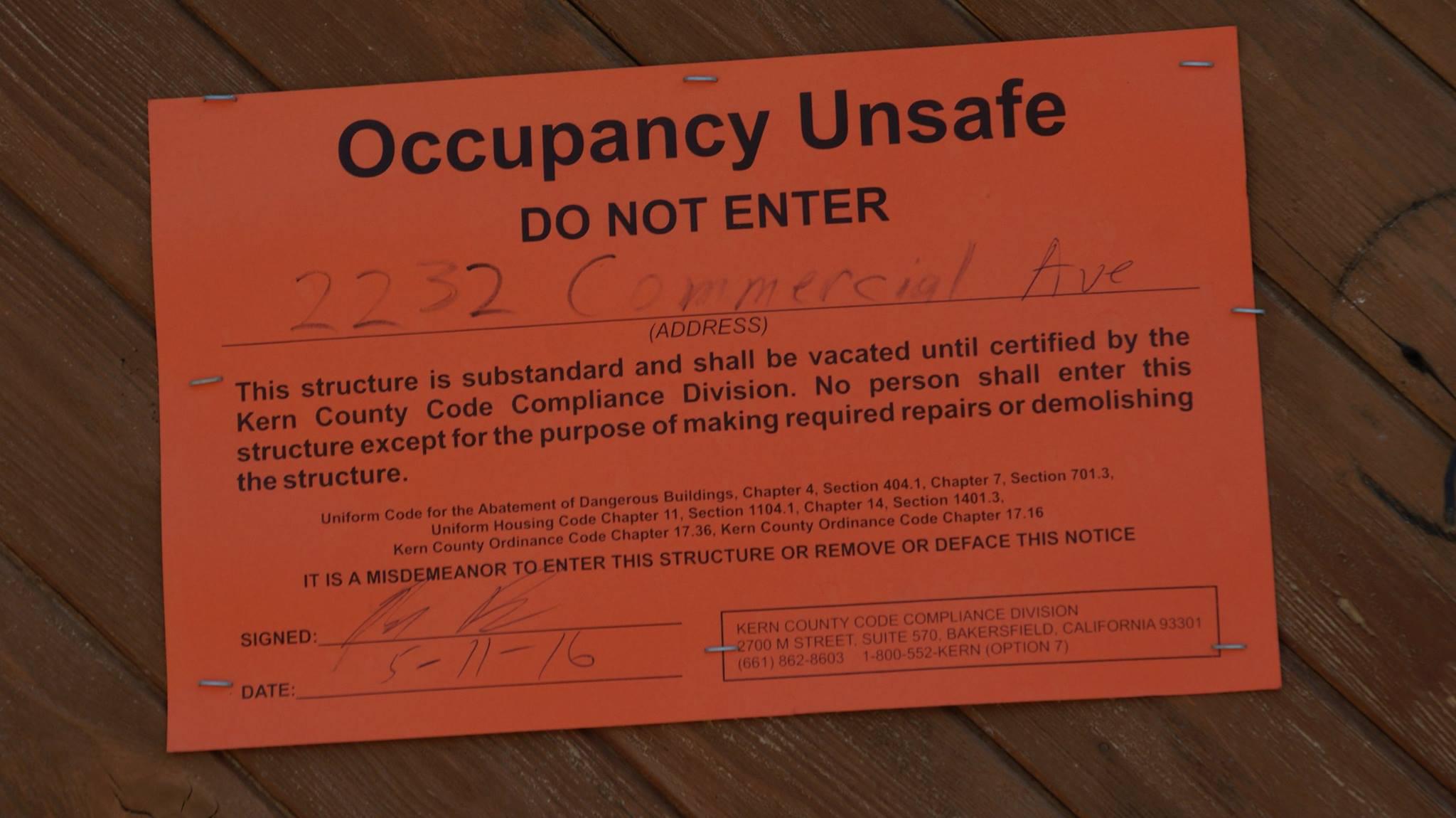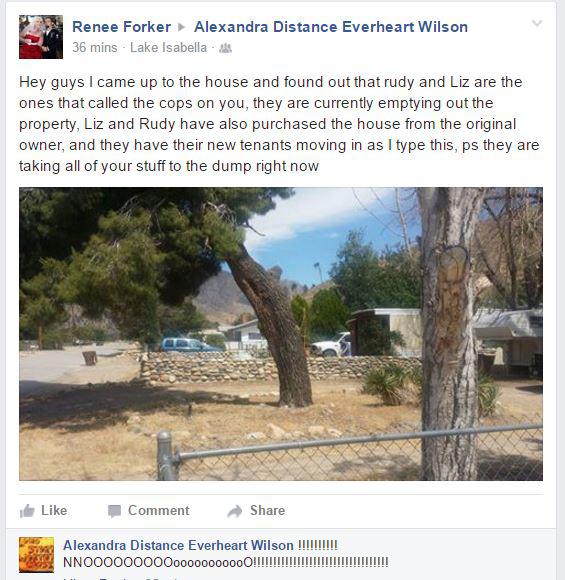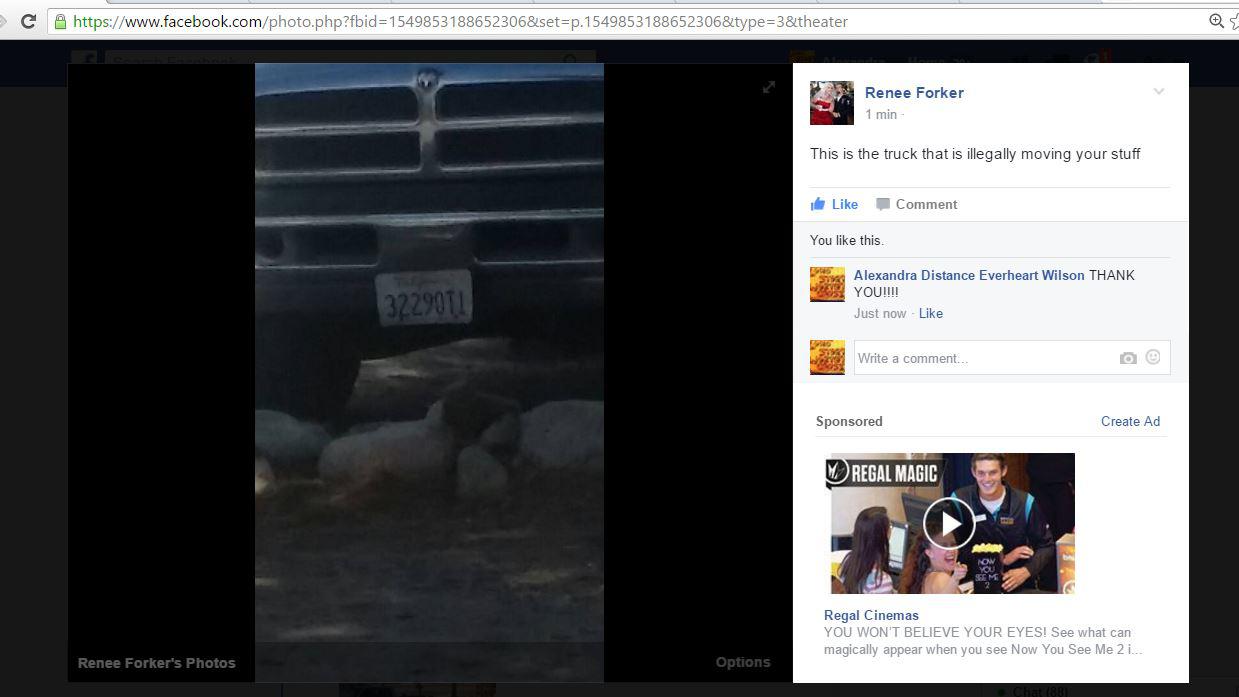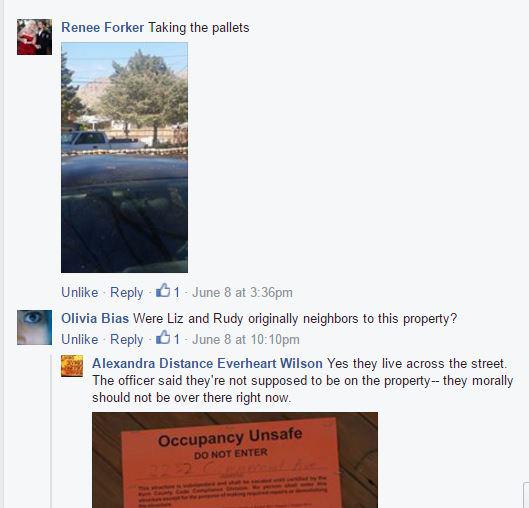Robbed by Kern County Sheriff’s Deputies
by Alexandra Wilson (updated 5/24/2020)
On May 11, 2016 Kevin Byrd and I were defrauded by five Kern County Sheriff’s Deputies who were accompanied by an unidentified code compliance inspector. We lost nearly all our personal property, our home, and the business we were developing due to an illegal forcible entry and detainer by the officers. Officers also harassed us, falsely arrested us on fabricated charges, and threatened us. As a result we became homeless for several years, working to survive and build this case so we could eventually expose what happened and hopefully obtain justice. Kevin and I believe officers’ actions constituted a hate crime due to their demeanor and repeated, flagrant misgendering of me because I’m transgender.
We suffered multiple injustices from county employees following the initial incident. Please read our story and the latest updates below. We are very fortunate to have been able to document as much as we did and be able to present it here publicly.
i. We legally claimed an abandoned property:
The following tabs explain the legal procedure we were following, as well as principals in law which apply:
According to accounts from neighbors, 2232 Commercial Ave had been abandoned more than 7 years prior to our entry on Aug. 31, 2015. It was evident that this was true – see Exhibit A - documentation of 2232 Commercial Ave. 3 CIV § 840 sets forth obligations of owners of life estates: “The owner of a life estate must keep the buildings and fences in repair from ordinary waste....” Record owners John and Cheryl Ross did not fulfill these obligations. For this reason, among other common law principals, their title had gone dormant. A dormant title is “a title to real estate held in abeyance, unasserted.” [1] “Abeyance, from the French buyer, to expect, is that which is in expectation, remembrance, and intendment of law. By a principle of law, in every land there is a fee simple in somebody, or else it is in abeyance; that is, though for the present it be in no man, yet it is in expectancy belonging to him that is next to enjoy the land.” [2] According to the doctrine of presumed dereliction, “a thing is presumed to have been abandoned when it so appears by acts or circumstances... where another is suffered to possess it without contradiction, or where possessory acts have long been abstained from. Rhodes v Whitehead, 27 Tex 304.” [1] Abandoned property is “property to which an owner has voluntarily relinquished all right, title, claim, and possession with the intention of terminating ownership, but without vesting it in any other person and with the intention of not reclaiming future possession or resuming ownership, possession, or enjoyment. 1 Am J2d Aband § 1." [1] 2232 Commercial Ave. was abandoned. Additional evidence: video footage: The following two videos filmed on Aug. 31, 2015 document the condition in which we discovered 2232 Commercial Ave: Video #1: Video #2: We exercised a right of entry on Aug. 31, 2015 to take possession of the abandoned property in hopes our title would ripen into title by prescription, as recognized at common law and described within 2 CIV §§ 1006-1007. A right of entry is, “The right of taking... possession of land or other real property in a peaceable manner... for a special purpose without committing trespass.” [2] 1 CIV § 1000 recognizes that title may in fact be acquired via occupancy. What constitutes occupancy in context with adverse possession is found within 2 CCP § 325(a): “For the purpose of constituting an adverse possession by a person claiming title, not founded upon a written instrument, judgment, or decree, land is deemed to have been possessed and occupied in the following cases: (1) Where it has been protected by a substantial enclosure, (2) Where it has been usually cultivated or improved.” We fulfilled both these requisites, Title by prescription is “a title acquired by use and time. The elements of such a title are open, visible, and continuous use under a claim of right, adverse to and with the knowledge of the owner. While a title by prescription does not rest upon statutes of limitations, the courts incline to consider a prescriptive period as analogous to the time fixed by the law of the state as to limitations for commencing actions for the recovery of real property.” [1] A prescriptive period is “The period fixed by local law as sufficient for obtaining or extinguishing a right through lapse of time.” [2] 2 CIV § 1007 and 2 CCP § 318 specify that the prescriptive period in California is 5 years. Record owners John and Cheryl Ross did not file an action for the recovery of real property within the prescriptive period. Lawful possession is defined as “possession based on a good-faith belief in and claim of right.” [1] A claim of right, in property law, occurs when “the claimant is in possession as owner with intent to claim the land as his own and not in recognition of or subordination to the record owner.” [3] A record owner is “the person who has title to real estate according to the public records.” [4] We claimed the land as our own and not in subordination to record owners John and Cheryl Ross because is was apparent they had abandoned the property. We were in possession amino domini, ”possession with the intent to own a thing; possession as an owner,” [1] or civil possession, “possession under a claim of ownership; a possession which anticipates the acquisition of ownership by prescription.” [5] The Ninth Amendment to the U.S. Constitution states: “The enumeration to the Constitution, of certain rights, shall not be construed to deny or disparage others retained by the people.” Rights not enumerated within the Constitution are referred to as unenumerated rights, “A right inferred from another legal right that is expressly stated in a statute or at common law. A right retained by the people but not explicitly mentioned in the Bill of Rights.” [3] The rights of entry and rights of possession (“right to occupy and enjoy property” [1] ) we exercised are substantive rights, “a right that can be protected or enforced by law; a right of substance rather than form.” [5] Our right to adhere to the procedure necessary for acquiring title by prescription is a procedural right, “a right that derives from legal... procedure; a right that helps in the protection or enforcement of a substantive right.” [3] We exercised a procedural right supported by California statutes and common law – a procedure which is necessary for establishing title by prescription or adverse title. 2232 Commercial Ave. was abandoned:
We exercised a right of entry:
We were in lawful possession:
Protected by the 9th Amendment:
ii. Local resident Rachel Smith claimed
an abandoned property next door:
After living at 2232 Commercial Ave. approximately 7 months, it became apparent that the property behind us, 2233 Angler Ave., was also abandoned. On 5–1–2016 local resident Rachel Smith performed a right of entry onto 2233 Angler Ave. in order to acquire title by prescription. We assisted her with installing a gate, weed abatement, and erecting a bamboo fence around the property in accordance with 1 CCP § 325(a) – see Exhibit B - documentation of 2233 Angler Ave. On 5–10–2016 Ms. Smith's neighbors, located at 2229 Angler. Ave, approached us and told us they reported to Kern County Sheriffs that we were trespassing and the sheriffs were “on the way”. We returned to our home and waited. Rachel came with. Soon Deputies Leonard Shin and Hector Ruiz opened our front gate (which had a "no trespassing" sign affixed to it) and trespassed onto our property in violation of 14 PEN § 602(k): “[E]very person who willfully commits a trespass by any of the following acts is guilty of a misdemeanor: (k) Entering any lands, whether unenclosed or enclosed by fence... with the intention of interfering with, obstructing, or injuring any... occupation carried on by... the person in lawful possession.” We attempted to explain the procedure we were following to the deputies. Rachel showed the claim she filed with the Kern County Assessor on 5–9–2016 (shown on pages 6–7 of Exhibit C). The deputies refused to honor Rachel's claim and the fact that such legal procedure could exist. Deputy Shin stated, “You think you found some loophole in the law.” Deputies threatened us not to return to 2233 Angler Ave. Rachel Smith was in lawful possession:
Accused of trespassing, Sheriffs arrive:
iii. Deputies and code compliance inspector
trespassed and defrauded us of our property:
On the morning of May 11 I called the Kern County Sheriff's Lake Isabella substation to request a police report from the day before so I could use the report as evidence to obtain an injunction to prevent further interruption from deputies. Instead of receiving a response to her request, five deputies trespassed onto our property, again violating 14 PEN § 602(k). Deputies were accompanied by a code compliance officer. Deputy Ruiz knocked loudly on the door, repeatedly requesting to speak with “Mr. Wilson.” He had run my license in the past and was intentionally misgendering me. I turned on the camcorder on Kevin's smartphone and began recording, then answered the door, stating, “I'm recording, officers.” Deputy Ruiz directed me to “stop recording” because we were “under arrest" for trespassing. Throughout the incident Ruiz continued to refer to me as “Mr. Wilson” and “Alexander” in order to harass me. On the arrest report, shown on page 1 of Exhibit D, Ruiz wrote that my gender was “male” and he referred to me as “him” within his the narrative. Because he stole Kevin's phone, the arrest report is the only evidence of this that we possess (besides our testimony). After I answered the door and announced I was recording, Deputy Ruiz directed me to stop recording because we were under arrest for “trespassing.” I reminded him of the legal procedure we were following (which we tried to explain the day before), however he stated that he “called the owner” and we “didn't have permission to be there.” I attempted to explain the procedure again and that we were in “lawful possession”, however he repeated that we were under arrest and I needed to “stop recording”. Not wanting to be charged with resisting arrest or get assaulted, I complied under duress. Immediately after I set down the phone, Ruiz took the phone and stated “I'm taking this as evidence.” Deputy Ruiz violated 7 PEN § 141(b) “A peace officer who knowingly, willfully, intentionally, and wrongfully... moves any physical matter, digital image, or video recording, with specific intent that the action will result in a person being charged with a crime or with the specific intent that the physical matter, digital image, or video recording will be concealed or destroyed, or fraudulently represented as the original evidence upon a trial, proceeding, or inquiry, is guilty of a felony punishable by two, three, or five years in the state prison.” Ruiz also violated 7 PEN § 146b “Every public officer... who, under the pretense or color of any process or other legal authority, does any of the following, without a regular process or other lawful authority, is guilty of a misdemeanor: (b) Seizes or levies upon any property.” False arrest is defined as “An arrest made without proper legal authority.” [3] 7 PEN § 141:“Every public officer... who, under the pretense or color of any process or other legal authority, does any of the following, without a regular process or other lawful authority, is guilty of a misdemeanor: (a) Arrests any person or detains that person against his or her will.” Not only did Deputy Ruiz have us falsely imprisoned, within the “Request Deny Release” section of the arrest reports he filed (page 3 of Exhibit D), he wrote: “It is likely the offense(s) will continue or resume, or the safety of the persons or property will be imminently endangered by release of the arrestee.” Ruiz attempted to have us falsely imprisoned for an extended duration. False imprisonment is “The restraint of a person in a bounded area without legal authority, justification, or consent. It applies to private as well as governmental detention.” [3] 8 PEN § 236: “False imprisonment is unlawful violation of the personal liberty of another.” Deputy Ruiz and assisting officers violated 8 PEN § 236.1(3): “Deprivation or violation of the personal liberty of another” includes substantial and sustained restriction of another’s liberty accomplished through force, fear, fraud, deceit, coercion, violence, duress, menace, or threat of unlawful injury to the victim or to another person, under circumstances where the person receiving or apprehending the threat reasonably believes that it is likely that the person making the threat would carry it out.” 8 PEN § 237(a): “False imprisonment is punishable by a fine not exceeding one thousand dollars ($1,000), or by imprisonment in the county jail for not more than one year, or by both that fine and imprisonment. If the false imprisonment be effected by violence, menace, fraud, or deceit, it shall be punishable by imprisonment pursuant to subdivision (h) of Section 1170.” Deputies threatened us not to return to the property or attempt to gather our personal property or else we would be arrested. Their motive, in whole or part, appeared to be based on their personal prejudice against me based on my apparent transgender medical condition. Deputies violated 11.6 PEN § 422.6: “(a) No person, whether or not acting under color of law, shall by force or threat of force, willfully injure, intimidate, interfere with, oppress, or threaten any other person in the free exercise or enjoyment of any right or privilege secured to him or her by the Constitution or laws of this state or by the Constitution or laws of the United States in whole or in part because of one or more of the actual or perceived characteristics of the victim listed in subdivision (a) of Section 422.55.” 11.6 PEN § 422.55(a): “'Hate crime' means a criminal act committed, in whole or in part, of one... the following actual or perceived characteristics of the victim: (2) Gender. Fraud is defined as, “Deceit, deception, or trickery that is intended to induce, and does induce another to part with anything of value or surrender some legal right.” [5] Fraud may done intentionally, called actual fraud, or unintentionally, called constructive fraud. Actual fraud is defined, “Intentional and successful employment of cunning, deception, or artifice to circumvent, cheat, or deceive another.” [1] Constructive fraud is defined, “Unintentional deception or misrepresentation that causes injury to another.” [3] Although we suspect officers will deny they defrauded us intentionally, it is our sincere belief based on their demeanor and apparent prejudice they commit actual fraud. Regardless whether performed intentionally or unintentionally, we were defrauded of our home and personal property. According to 18 PEN § 484(a) deputies are guilty of "theft by fraud": “Every person who shall feloniously... knowingly and designedly, by any false or fraudulent representation or pretense, defraud any other person of... real or personal property... is guilty of theft. In determining the value of the property obtained... the reasonable and fair market value shall be the test..... [A]ny false or fraudulent representation or pretense made shall be treated as continuing, so as to cover any money, property or service received as a result thereof, and the complaint, information or indictment may charge that the crime was committed on any date during the particular period in question....” If deputies were following orders, commanding officer(s) were principals in the crime: 2 PEN § 31, “All persons concerned in the commission of a crime, whether it be felony or misdemeanor, and whether they directly commit the act constituting the offense, or aid and abet in its commission, or, not being present, have advised and encouraged its commission... to commit any crime... or who, by threats, menaces, command, or coercion, compel another to commit any crime, are principals in any crime so committed.” 13 PEN § 518(a) “Extortion is the obtaining of property or other consideration from another, with his or her consent, or the obtaining of an official act of a public officer, induced by a wrongful use of force or fear, or under color of official right.” 13 PEN § 519(2): ”Fear, such as will constitute extortion, may be induced by a threat of any of the following: 2. To accuse the individual threatened..., of a crime.” 13 PEN § 487 “Grand theft is theft committed...: (a) When the... real or personal property taken is of a value exceeding nine hundred fifty dollars ($950)....” On May 10 Deputy Shin noticed the incinerating toilet we were in the process of building. Without knowing what it was or asking about it, he accused us: “You're shitting back here!?” I informed him that it was an incinerating toilet and that we were still in the process of building it - see Exhibit E - purpose and design of the incinerating toilet. Deputies Shin and Ruiz, however, apparently decided to lie and/or exaggerate because on May 11 they arrived with a code compliance inspector who fraudulently deemed the entire property "unsafe": Code compliance employee Although the above notice cites the Uniform Code for the Abatement of Dangerous Buildings, the inspector violated section 201.3 Right of Entry of that code when he trespassed alongside the officers: “When... the building official or the building official’s authorized representative has reasonable cause to believe that there exists in a building or upon a premises a condition which is contrary to or in violation of this code which makes the building or premises unsafe, dangerous or hazardous, the building official may enter the building or premises at reasonable times to inspect or to perform the duties imposed by this code, provided that if such building or premises be occupied that credentials be presented to the occupant and entry requested. If such building or premises be unoccupied, the building official shall first make a reasonable effort to locate the owner or other persons having charge or control of the building or premises and request entry. If entry is refused, the building official shall have recourse to the remedies provided by law to secure entry.” The inspector violated 14 PEN § 602(k) (trespassing): “[E]very person who willfully commits a trespass by any of the following acts is guilty of a misdemeanor: (k) Entering any lands, whether unenclosed or enclosed by fence, for the purpose of injuring any property or property rights or with the intention of interfering with, obstructing, or injuring any lawful... occupation carried on by the... the person in lawful possession.” Besides being written on the inspector's notice, Deputy Ruiz wrote on the arrest report that we violated Uniform housing code 17.16.620-surfacing sewage, as shown on page 3 of Exhibit D. Officers fabricated these disgusting charges in order to misinform the public and slander our reputations. Instead of telling the public we were following a legal procedure and that we were in lawful possession, officers chose to inform the community that "squatters trespassed and were shitting in the backyard” in order to cater to the prejudices their political constituents instead of enforcing the law. 7 PEN § 182. “(a) If two or more persons conspire: (1) To commit any crime. (2) Falsely and maliciously to indict another for any crime, or to procure another to be charged or arrested for any crime. (4) To cheat and defraud any person of any property, by any means which are in themselves criminal, or to obtain money or property by false pretenses or by false promises with fraudulent intent not to perform those promises. (5) To commit any act injurious to the public health, to public morals, or to pervert or obstruct justice, or the due administration of the laws. They are punishable as follows: [T]hey shall be punishable in the same manner and to the same extent as is provided for the punishment of that felony. If the felony is one for which different punishments are prescribed for different degrees, the jury or court which finds the defendant guilty thereof shall determine the degree of the felony the defendant conspired to commit. If the degree is not so determined, the punishment for conspiracy to commit the felony shall be that prescribed for the lesser degree.... If the felony is conspiracy to commit two or more felonies which have different punishments and the commission of those felonies constitute but one offense of conspiracy, the penalty shall be that prescribed for the felony which has the greater maximum term. When they conspire to do an act described in paragraph (4), they shall be punishable by imprisonment in a county jail for not more than one year, or by imprisonment pursuant to subdivision (h) of Section 1170, or by a fine not exceeding ten thousand dollars ($10,000), or by both that imprisonment and fine. When they conspire to do any of the other acts described in this section, they shall be punishable by imprisonment in a county jail for not more than one year, or pursuant to subdivision (h) of Section 1170, or by a fine not exceeding ten thousand dollars ($10,000), or by both that imprisonment and fine. All cases of conspiracy may be prosecuted and tried in the superior court of any county in which any overt act tending to effect the conspiracy shall be done. (b) Upon a trial for conspiracy, in a case where an overt act is necessary to constitute the offense, the defendant cannot be convicted unless one or more overt acts are expressly alleged in the indictment or information, nor unless one of the acts alleged is proved; but other overt acts not alleged may be given in evidence.” trespassed onto our property:
harassed me because I'm transgender:
stole Kevin's phone:
falsely arrested and imprisoned us:
threatened us:
(6) Sexual orientation.
(7) Association with a person or group with one or more of these actual or perceived characteristics.” commit fraud:
commit extortion:
13 PEN § 520: “Every person who extorts property or other consideration from another, under circumstances not amounting to robbery or carjacking, by means of force, or any threat, such as is mentioned in Section 519, shall be punished by imprisonment pursuant to subdivision (h) of Section 1170 for two, three or four years.”
commit grand theft:
condemned the property under false pretenses:
illegally condemned the property: violated criminal conspiracy statutes:
iv. Subsequent injustices:
On May 13 (two days after we were arrested) we informed the secretaries at the Lake Isabella Substation about what happened. After being told that Sgt. Bravo was "too busy" to meet with us, we requested they at least let us gather our belongings. A secretary told us they would “send a deputy over.” Deputy Josh Cain met us at the house, where he informed us we could only gather belongings we had receipts for. Like most people we did not have receipts for the majority of our belongings. We were able to gather some items, however soon after we met he received a call and told us we had to leave. Deputy Cain told us we could contact the substation later to gather more of our belongings, however when we contacted the substation we were told that “Deputy Cain wrote in his notes" that we "gathered all our belongings”. Sheriffs did not permit us to gather any more of our property from that point forward. Deputies violated 13 PEN § 496a: “(a) Every person who... withholds, or aids in withholding any property from the owner, knowing the property to be so stolen or obtained, shall be punished by imprisonment in a county jail for not more than one year, or imprisonment pursuant to subdivision (h) of Section 1170.... A principal in the actual theft of the property (see 2 PEN § 31) may be convicted pursuant to this section. However, no person may be convicted both pursuant to this section and of the theft of the same property. (c) Any person who has been injured by a violation of subdivision (a) or (b) may bring an action for three times the amount of actual damages, if any, sustained by the plaintiff, costs of suit, and reasonable attorney’s fees.” Two days after we met with Deputy Cain, on Monday, 5-16-2016, we returned to the Sheriff's substation to request to gather more of our belongings. One secretary went into the back “to speak with Sergeant Bravo,” but upon returning stated that we “need to find an attorney.” I then requested copy of the police report for case #SR1612967 (May 11 incident) but the secretary told me that neither Kevin nor I were “listed as the victim” and that “only the victim” could receive a copy. I asked who was listed as the “victim,” and she replied, “Jon Ross.” Following additional pleading to gather more of our belongings, she went to speak with Sergeant Bravo, then returned and stated that an officer would meet us at the property. We walked back and waited at our neighbor's house. A Sheriff's vehicle came speeding down Commercial Ave. (coming from Lake Isabella Blvd.) and stopped in the middle of the street in front of our house. Deputy Shin stepped out, and with his hand on his nightstick he repeatedly accused us of having “just come off the property.” We were shocked and frightened at the accusations, and told him we were not on the property and that we had been waiting at Ginger and Angela's next door. Again he stated that he had just seen us leave the property. I reiterated we had not been on the property. Just as in our previous interaction, Deputy Shin acted in an aggressive, accusatory manner. Deputy Shin directed us to meet him in the backyard, but due to his threatening demeanor I responded, “We're not going onto the property with you. I'm scared of you.” We backed away to leave, and he promptly got in the vehicle and sped away. Assault is "An attempt or offer to beat another, without touching him; as if one lifts up his cane or his fist in a threatening manner at another ; or strikes at him, but misses him." Although California's penal code does not contain assault statutes, it is a common law offense. Deputy Shin assaulted us. Wednesday 5–18–2016: Kevin and I requested a copy of the police report from the two days the officers were at our home, however we were denied because we were “not listed as the victim” (even though we were the victims in this case). I informed the secretaries we had a “right to have access to the information” because the Fourteenth Amendment guarantees “equal protection of the laws” and we needed the information “to build our case.” We were still denied access to the report. Ms. Rachel Smith also requested a copy and was also denied. Kevin and I became homeless without a phone on May 11 (when officers defrauded us and stole Kevin's phone). Subsequently, our physical and emotional health continued to deteriorate. To make matters worse, on several occasions deputies drove by slowly and stared out the window at us intimidatingly. We were scared to walk in public and heard from many people we should "be careful" because the sheriffs were "corrupt". This was common knowledge. For more information see the Guardian article, The County: the story of America’s deadliest police. Afraid for our lives, Kevin and I fled the county, from where I continued to write our testimony, research laws the officers violated, and compile what evidence we had. June 8th, 2016 - (less than a month after we were forced form our home) our neighbor, Renee Forker, informed us that Rudy and Liz Hemmiger were hauling our personal property out of our home to take it to the dump, and that they had allegedly purchased the property. She informed us via posting photos on my Facebook wall: Closeup of above photo: Photo of license plate Photo of truck (and corresponding dialogue): Rudy and Liz rented out our home (that we fixed up): Renee messaged me saying that Rudy and Liz told her they planned to rent the house out: Less than a year later, a woman by the name of Karen Alexander who informed me that Rudy and Liz were renting our home to her. She stated that she "found paperwork belonging to us" and began asking around. She said that they were "terrible landlords" and that they "didn't even own the house." If Rudy and Liz did purchase the title, they did so illegally: Rudy and Liz commit a crime known as buying titles: The purchase of the rights or claims to real estate of a person who is not in possession of the land or is disseised. Void, and an offense, at common law. Whitaker v. Cone, 2 Johns. Cas. (N.Y.) 59; Brinley v. Whiting, 5 Pick. (Mass.) 356. [8] Although California's penal code does not specify an offense for "buying titles", it is still a common law offense. § 22.2 of California's Civil Code states: “The common law of England, so far as it is not repugnant to or inconsistent with the Constitution of the United States, or the Constitution or laws of this State, is the rule of decision in all the courts of this State.” Furthermore, Rudy and Liz knew they were stealing our personal property. While in jail on May 11-12, Kevin and I were given the option to either: Both of us signed the promises to appear, then on July 6 we traveled from Fairfax, CA to Bakersfield, then to the Superior Court in Ridgecrest (409 miles travel). To our surprise, we were not listed on the court calendar! (to prove this, we purchased a copy of the calendar. Why we weren't on the calendar: After informing the clerk about what happened, she told us that the "district attorney never sent over our file" and that this happens to people "all the time". That was the reason we did not show up on the calendar even though by law we were required to appear. She advised us to “call the courthouse every two days” because eventually the district attorney would send over our file. We needed to "call within two days of whenever they send the file" or else "an arrest warrant would be issued". I asked when she expected the D.A. might send the file. She said they have "up to one year". Reeling from this, I reiterated to ensure I heard properly, "We need to call the courthouse every 2 days for the next year or we risk having an arrest warrant issued?" She confirmed that this was the case. December 26, 2017 - I called the Superior Court of Kern County (Ridgecrest, CA) on a recorded line to find out why we were not on the calendar when we showed up to our arraignments on on July 7. Listen to the audio here: An arrest warrant was issued as a result of the county's abuse of process - not as a result of our failure to appear. abuse of process - improper, intentional, tortious use of civil or criminal process to obtain a result that is either unlawful or beyond the purpose for which such process was designed. — aka abuse of legal process; malicious abuse of process; malicious abuse of legal process; wrongful process; wrongful process of law. March 4, 2020 - After recently moving back to Fairfax, CA (>300 miles away from Lake Isabella), Kevin was stopped by an officer who ran his name. (Kevin was walking through town and the officer ran his name because it is common practice of Fairfax PD to run names of individuals who appear potentially homeless or low income.) Kevin was then arrested based on the outstanding arrest warrant that appeared to be caused by the District Attorney's aforementioned abuse of process (see previous tab). Kevin's appearance was now scheduled for April 2. View Arrest Report. Kevin given only 4 days notice to appear in court! On 3-29-2020 Kevin received this order to transfer venue from Ridgecrest to Mohave. The order was issued only days before on 3/26/2020). Kevin was given only 4 days notice that he needed to appear in court even though he lives over 350 miles away from the courthouse! What's more - Kevin is covered under the Americans with Disabilities Act; Rule 1.100(c)(3) of the California Rules of Court requires Requests for accommodations for persons with disabilities "must be made... no fewer than 5 court days before the requested implementation date." Kevin was not given sufficient time to be able to make a request for accommodations. Oct. 21, 2020 - Kevin was again arrested in Fairfax and released on his own recognizance. His court date was set for November 21. He was made to sign this this Promise to Appear. deputies withheld our personal property:
Deputy Shin assaulted us:
We were denied copies of police reports:
We fled for our safety to Northern California:
Corrupt neighbors Rudy and Liz Hemmiger burglarized our home - then illegally rented it out:
of truck that was taking our belongings: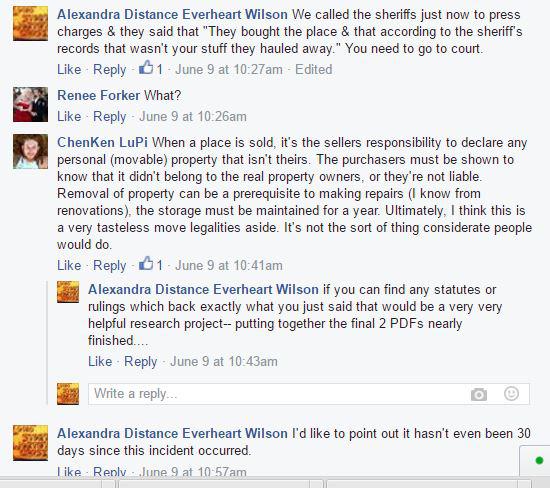
District Attorney commit an Abuse of Process, causing an unjust arrest warrant to be issued:
1. sign a promise to appear and be released on our own recognizance; or
2. remain falsely imprisoned for an additional 2 months until our arraignments scheduled on July 7th.
Kevin arrested due the D.A.'s unjust arrest warrant:
v. Case filings (civil and criminal):
Kevin filed two general liability claims with Kern County Risk Management: one on 7/6/2016 and the other, more thorough one 3/12/2020. NOTE: Due to the fact that we were homeless as a result of the officers' actions and because Greater Bakersfield Legal Aid "can't assist with real estate cases", this claim did not appear as professional as we'd have liked. However, we did not want our claim to be barred by the 6 month time limit imposed by the county, so we went ahead and filed the initial claim, then filed the second one as soon as possible. Both claims and attachments may be downloaded below: Initial Claim - filed 7/6/2016 as a very rough draft of the second claim Second Claim- filed 3/12/2020 alongside the following ATTACHMENTS A and B: Due to the fact that we were homeless as a result of the officers' actions and because Greater Bakersfield Legal Aid "can't assist with real estate cases", our initial complaint appears very unprofessional (I hitchhiked to the Sheriff's Office in order to file it by hand). We did not want our complaint to be barred by the statute of limitations, however, so we went ahead and filed our initial Complaint on 6/6/2020. Apr 2020 Complaint to Internal Affairs- filed April 2020 We are currently awaiting a response. Two claims w/ Kern Cty Risk Management:
Two complaints against officers w Internal Affairs:
vii. The limitations period has not lapsed:
3 PEN § 803 sets forth that the limitations period for “an offense punishable by imprisonment in the state prison or imprisonment pursuant to subdivision (h) of Section 1170” may be toiled or extended. This applies to several of the aforementioned crimes, including 8 PEN § 237(a) (false imprisonment), 13 PEN § 520 (extortion), 13 PEN § 496 (withholding stolen property), and 7 PEN § 182 (criminal conspiracy). 3 PEN § 803: “(a) Except as provided in this section, a limitation of time prescribed in this chapter is not tolled or extended for any reason. 2 CCP § 335.1 allows two years to file an action for law enforcement misconduct. However, where there is a civil conspiracy, the limitations period is tolled until the “last overt act” in furtherance of the conspiracy. Wyatt vs. Union Mortgage (1979) 24 Cal.3d 773, 786-789. By causing Kevin to be arrested on March 4, 2020, defendants committed an overt act in furtherance of the conspiracy, thereby causing the statute to be tolled until at least that date. California’s tort claims statutes will have no applicability because plaintiffs’ can sue for violation of Federal Civil Rights, in either state or federal court. Suits for violation of federal civil rights laws are not subject to California laws governing claims against public entities. Williams vs, Horwath (1976) 16 Cal.3d 836. 18 USC § 3282 states that, "(e)xcept as otherwise expressly provided by law, a prosecution for a non-capital offense shall be instituted within five years after the offense was committed. “ Deputies violated the following federal statutes: 18 U.S.C § 242 Deprivation of rights under color of law: “Whoever, under color of any law, statute, ordinance, regulation, or custom, willfully subjects any person in any State... to the deprivation of any rights... secured or protected by the Constitution or laws of the United States... shall be fined under this title or imprisoned not more than one year, or both....” 42 U.S.C. § 1985 Conspiracy to interfere with civil rights: “If two or more persons in any State... conspire... on the premises of another, for the purpose of depriving, either directly or indirectly, any person or class of persons of the equal protection of the laws, or of equal privileges and immunities under the laws; or for the purpose of preventing or hindering the constituted authorities of any State... from giving or securing to all persons within such State... the equal protection of the laws...; in any case of conspiracy set forth in this section, if one or more persons engaged therein do, or cause to be done, any act in furtherance of the object of such conspiracy, whereby another is injured in his person or property, or deprived of having and exercising any right or privilege of a citizen of the United States, the party so injured or deprived may have an action for the recovery of damages occasioned by such injury or deprivation, against any one or more of the conspirators.” State criminal laws:
(c) A limitation of time prescribed in this chapter does not commence to run until the discovery of an offense described in this subdivision. This subdivision applies to an offense punishable by imprisonment in the state prison or imprisonment pursuant to subdivision (h) of Section 1170, a material element of which is fraud..., or the basis of which is misconduct in office by a public officer, employee, or appointee, including, but not limited to, the following offenses:
1) Grand theft of any type [or] falsification of public records.” Limitations period extended for civil case:
Federal laws:
In front of our home on May 11, 2016:
Thank you for reading! Please support:
References:
[1]: Ballantine’s Law Dictionary with Pronunciations Third Edition by James A. Ballantine (James Arthur 1871-1949). Edited by William S. Anderson. © 1969 by THE LAWYER’S CO-OPERATIVE PUBLISHING COMPANY. Library of Congress Catalog Card No. 68-30931
[2]: 1 Richard Burn, A New Law Dictionary 4 (1792)
[3]: Black’s Law Dictionary Deluxe Tenth Edition by Henry Campbell Black, Editor in Chief Bryan A. Garner. ISBN: 978-0-314-61300-4
[4]: Barron’s Law Dictionary 3d Ed. By Steven H. Hifis. (1975, 1984, 1991). ISBN 0-8120-4633-1. – ISBN 0-8120-4628-5.
[5]: Ballantine’s Law Dictionary Legal Assistant Edition by Jack Ballantine (James Arthur 1871-1949). Doctored by Jack G. Handler, J.D. © 1994 Delmar by Thomson Learning. ISBN 0-8273-4874-6.
[6]: The Guardian, “The County: the story of America’s deadliest police“ by by Jon Swaine and Oliver Laughland: https://www.theguardian.com/us-news/2015/dec/01/the-county-kern-county-deadliest-police-killings
[7]: ABC 7 News, “Kern County Sheriff caught on tape saying it costs less to kill suspects” (2018): https://abc7news.com/sheriff-caught-on-tape-saying-it-costs-less-to-kill-suspects/3337751/
[8]: Black’s Law Dictionary, 2nd Edition online: https://thelawdictionary.org/

